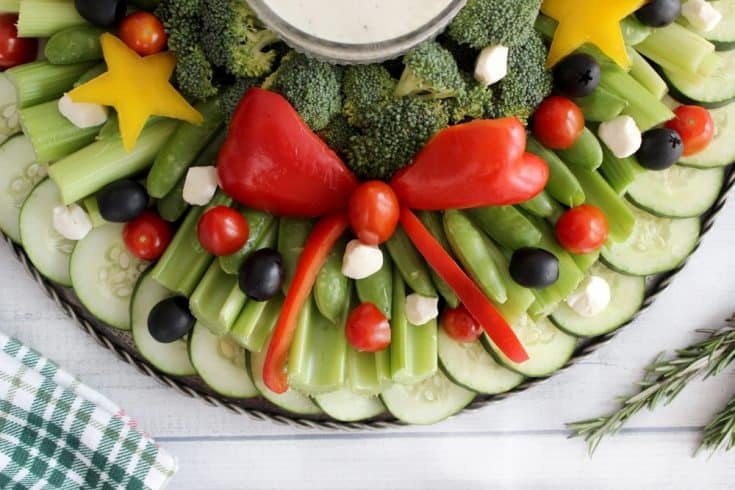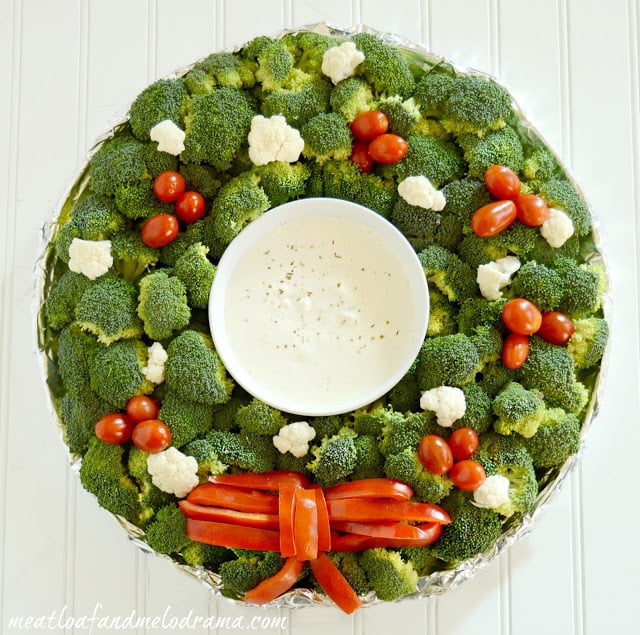The Festive Charm Of A Vegetable Wreath: A Culinary Masterpiece For Christmas Gatherings
The Festive Charm of a Vegetable Wreath: A Culinary Masterpiece for Christmas Gatherings
Related Articles: The Festive Charm of a Vegetable Wreath: A Culinary Masterpiece for Christmas Gatherings
Introduction
In this auspicious occasion, we are delighted to delve into the intriguing topic related to The Festive Charm of a Vegetable Wreath: A Culinary Masterpiece for Christmas Gatherings. Let’s weave interesting information and offer fresh perspectives to the readers.
Table of Content
The Festive Charm of a Vegetable Wreath: A Culinary Masterpiece for Christmas Gatherings

The Christmas season evokes a sense of warmth, togetherness, and indulgence. While traditional feasts often dominate the holiday table, a creative and healthy alternative emerges in the form of a vegetable wreath. This delightful centerpiece, crafted with fresh, vibrant vegetables, not only adds a touch of festive cheer but also provides a nutritious and visually appealing addition to any Christmas gathering.
The Art of the Vegetable Wreath: A Culinary Canvas
A vegetable wreath is more than just a platter of vegetables arranged in a circle. It is a culinary masterpiece that combines artistry, creativity, and culinary expertise. The process of constructing a vegetable wreath involves a careful selection of ingredients, meticulous preparation, and a touch of artistic flair.
Ingredient Selection: A Symphony of Colors and Textures
The key to a successful vegetable wreath lies in the selection of ingredients. A diverse range of vegetables, each with its unique color, texture, and flavor, contributes to the overall appeal and nutritional value of the wreath.
- Leafy Greens: Kale, spinach, and romaine lettuce provide a vibrant green base, adding a refreshing and crisp element to the wreath.
- Cruciferous Vegetables: Broccoli florets, Brussels sprouts, and cauliflower add a touch of texture and a nutty flavor.
- Root Vegetables: Carrots, beets, and radishes bring a burst of color and sweetness, while adding a grounding element to the wreath.
- Other Vegetables: Bell peppers, cucumbers, cherry tomatoes, and zucchini offer a variety of colors, shapes, and textures, enhancing the visual appeal of the wreath.
Preparation: The Foundation of a Culinary Masterpiece
Once the ingredients are selected, meticulous preparation is essential.
- Washing and Drying: Thorough washing removes dirt and debris, ensuring a clean and hygienic wreath. Drying the vegetables thoroughly prevents excess moisture from affecting the presentation.
- Cutting and Shaping: Vegetables are cut into various shapes and sizes to create visual interest and facilitate easy consumption.
- Marinades and Dressings: Marinades and dressings, such as a balsamic vinaigrette or a herb-infused oil, enhance the flavor and add a touch of complexity to the vegetables.
Assembly: A Creative Expression
The assembly of the vegetable wreath is where the artistic flair comes into play.
- The Base: A sturdy base, such as a large platter or a wooden cutting board, provides a stable foundation for the wreath.
- Arrangement: The vegetables are arranged in a circular pattern, mimicking the shape of a wreath. A combination of colors, textures, and shapes creates a visually appealing and balanced presentation.
- Decorations: Fresh herbs, edible flowers, and festive ornaments, such as cranberries or pomegranate seeds, can be incorporated to enhance the visual appeal and add a touch of holiday cheer.
Beyond the Aesthetics: A Feast for the Senses
The vegetable wreath is not just a visual delight; it is also a culinary experience that tantalizes the taste buds. The combination of fresh, seasonal vegetables offers a burst of flavor and nutrients, making it a healthy and satisfying addition to any holiday gathering.
The Nutritional Benefits of a Vegetable Wreath
The vegetable wreath is a nutritional powerhouse, packed with vitamins, minerals, and antioxidants.
- Vitamins: Leafy greens are rich in Vitamins A, C, and K, while carrots are a good source of Vitamin A.
- Minerals: Broccoli, Brussels sprouts, and cauliflower are excellent sources of potassium and folate.
- Antioxidants: The vibrant colors of the vegetables indicate a high concentration of antioxidants, which protect the body from damage caused by free radicals.
A Festive and Healthy Alternative
The vegetable wreath offers a refreshing alternative to traditional holiday feasts, promoting a healthy and balanced diet during the festive season. It can be served as a side dish, a main course, or even a light and refreshing snack.
FAQs about Vegetable Wreaths:
Q: What are some tips for creating a visually appealing vegetable wreath?
A:
- Use a variety of colors, shapes, and textures to create visual interest.
- Arrange the vegetables in a circular pattern, mimicking the shape of a wreath.
- Incorporate fresh herbs, edible flowers, and festive ornaments for added visual appeal.
Q: How can I ensure that the vegetable wreath stays fresh?
A:
- Choose fresh, high-quality vegetables.
- Wash and dry the vegetables thoroughly before assembling the wreath.
- Store the wreath in a cool, dry place until ready to serve.
- Avoid using any marinades or dressings that might cause the vegetables to wilt.
Q: What are some alternative ingredients for a vegetable wreath?
A:
- Fruits: Strawberries, blueberries, and raspberries can add sweetness and a pop of color.
- Nuts: Almonds, walnuts, and pecans provide a crunchy texture and a nutty flavor.
- Cheese: Feta cheese, goat cheese, and mozzarella cheese can add a creamy and tangy element to the wreath.
Q: Can I make a vegetable wreath ahead of time?
A:
- Yes, you can assemble the vegetable wreath up to a few hours before serving.
- Store it in a cool, dry place to prevent the vegetables from wilting.
Tips for Creating a Festive Vegetable Wreath:
- Theme: Consider a theme for your wreath, such as a winter wonderland or a festive celebration, and choose vegetables that reflect that theme.
- Color Palette: Choose a color palette that complements your holiday decor, such as red, green, and white.
- Presentation: Present the wreath on a beautiful platter or cutting board, and use festive napkins and tablecloths to enhance the presentation.
- Serving: Serve the wreath with a variety of dipping sauces, such as hummus, guacamole, or a creamy yogurt dip.
Conclusion:
The vegetable wreath is a culinary masterpiece that combines artistry, creativity, and health benefits. It is a festive and nutritious alternative to traditional holiday feasts, adding a touch of color, flavor, and cheer to any Christmas gathering. By embracing the art of the vegetable wreath, you can create a culinary experience that delights the senses and nourishes the body.








Closure
Thus, we hope this article has provided valuable insights into The Festive Charm of a Vegetable Wreath: A Culinary Masterpiece for Christmas Gatherings. We hope you find this article informative and beneficial. See you in our next article!
Leave a Reply